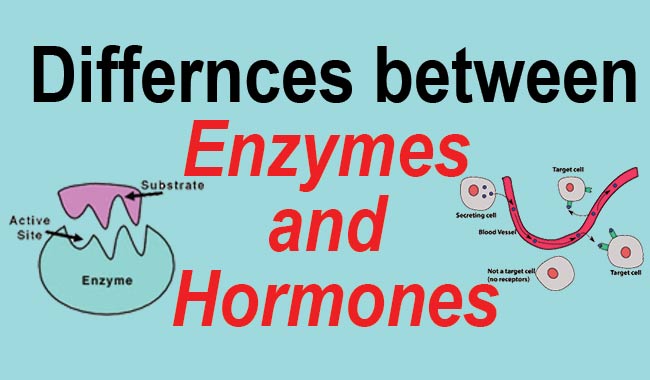Enzymes are the biological catalyst which speed up the rate of biochemical reactions without undergoing any changes.
Hormones are molecules, usually a peptide (eg: insulin) or steroid (eg: estrogen) that is produced in one part of an organisms and triggers a specific cellular reactions in target tissues and organs some distance away.
| S.N. | Enzymes | Hormones |
|---|---|---|
| 1. | Mostly enzymes perform reactions at the place of origin i.e. in cells where they are produced. | Hormones perform activity at some distance away from the site of origin. |
| 2. | Enzymes are biological catalyst. They catalyze the biological reactions. | Hormones are not catalyst. They simply initiate biochemical reactions. |
| 3. | All enzymes are generally proteins. There are some exceptions like ribozymes (RNA with catalytic activity). | The hormones may be polypeptides, terpenoids, steroids, phenolics compounds or amines. |
| 4. | Enzymes are not translocate from one part to another part of cell. | Most of the hormones show polar translocation. |
| 5. | As enzymes are catalyst, at the end of reaction they remain unchanged and can be reutilized. | As hormones are not catalyst, they participate in biological reaction and their chemical composition is changed and cannot be reutilized as such. |
| 6. | They are macromolecules with higher molecular weight. | They have only low molecular weight. |
| 7. | They are non-diffusible through cell membrane. | They are diffusible through cell membrane. |
| 8. | They either act intracellularly or carried by some ducts to another site. | Generally carried by blood to a target organ. |
| 9. | It increases the rate of metabolic physiological processes. | They may be either excitatory or inhibitory in their action. |
| 10. | They catalyze reversible reactions. | Hormone controlled reactions are not reversible. |
| 11. | Reaction rate increases with increase in their concentration up to a limit. | Deficiency or overproduction of hormone causes metabolic disorders or diseases. |
| 12. | They act quickly. | Some hormones are quick acting, while some are slow acting with a lag period. |
| 13. | They are not used in metabolic functions. | They are used up in metabolic functions. |
| 14. | They cannot regulate morphogenesis. | Generally regulate morphogenesis, especially secondary sex character. |
| 15. | Examples: – Oxidoreductases – Transferases – Hydrolases | Examples: – Insulin, – Glucagon, – T3, T4, |


Metabolic functions means that, they are involved in breacking down of substance or larg organic molecules like food, but not invoved in production of substance in the body.
They are not used in metabolism meaning that THEY DO NOT PARTICIPATE IN BREAKING DOWN OF FOOD SUBSTANCES..
Rather they just speed up the rate of metabolization meaning that THEY WORK AS CATALIST
Can any one explain the point 13 that enzyme are not used in metabolic function???????thanks in advance
metabolic function means that related to body physical activities not inner activities like digestion actually it is related to voluntary actions
Chemical composition of enzymes remains the same before & after a reaction…enzymes in body function just like catalysts in chemistry …they just control the speed of a metabolic reaction [I.e. any reaction taking place in a living cell]…A reaction can proceed in different courses …enzymes direct the course of a reaction along the path of lowest energy transition during the reaction but themselves remain unaltered and undisturbed.